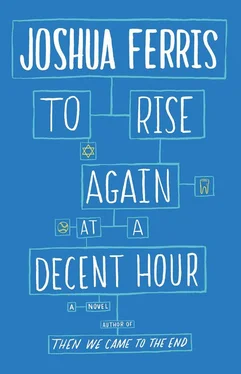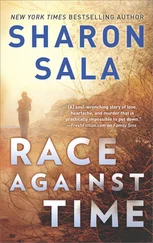“You’re a sadist, Doctor. A real sadist. I come in here, a Scud missile bearing down on my nerve, and you demand that I share the story of my greatest spiritual failure. Is this what you call compassion?”
I leaned back against the sink, crossed my arms, and swung one ankle over the other.
“Okay, okay,” he said. “In the end, I couldn’t do it. It’s been too long. I was raised a Christian. All those years of prayer. I have the God gene, I guess, for good or ill.”
“You mean you couldn’t doubt?”
“I had every reason to.” He sat up and tucked his feet under his legs in some kind of Eastern position. “Have you heard of Cliff Lee, the geneticist? Dr. Clifford Lee, of Tulane University?”
Frushtick explained that Dr. Clifford Lee had held the Howard Rose Professorship at the Hayward Genetics Center of Tulane University in New Orleans for years until Grant Arthur revealed to him that he was an Ulm. A year later, Lee relocated his family to Israel to work on isolating the genetic particulars of the Ulms. His work, according to Frushtick, who suddenly spoke with all the technical command of a scientist, centered around modal haplotypes, microsatellites, and unique event polymorphisms: difficult genetic data necessary to prove Ulm-specific ancestry.
“He devised a test that’s sixty to seventy-five percent accurate,” he said. “Eighty percent if you came north out of the Sinai into the Rhine Valley prior to the Ashkenazi migration. There was some intermingling between the two groups, obviously, but given their bitter history, not enough to affect the testing.”
“Testing of what?”
“Ulmish descent. There are no guarantees, just ballpark figures — he’s very clear about that. For me personally, there was a seventy percent chance. But whatever Lee’s test lacks, Arthur supplements with a case file.”
“What does that do?”
“Haven’t you been listening, Doctor? It proves that you’re an Ulm.”
Grant Arthur’s research was exhaustive. Frushtick still recalled the amazement that overtook him as Arthur laid out his file for the first time. The names of ancestors, place and date of births and deaths, eternal branchings of an ancient family tree. Arthur went out into the world, to all its repositories of records, contracts, military conscriptions, cadastres, in the name of finding the lost. He wasn’t just reclaiming souls; he was restoring an order too grievously out of whack to ever be put right in his lifetime. It gave him a certain zeal.
“There were wills, land records, census records,” Frushtick said. “He had documents from government registries, hospitals, foreign courts. Licenses in foreign languages — many of which he speaks fluently. Port records, notary records, ship logs. I picture him on trains shunting across the tundra, landing in propjets in unstable countries, carrying his overstuffed valise with the portable scanner, sleepless again, hair rumpled, unhappy, but on his way to a library and some new name. It will give him just enough of what he needs to reaffirm his purpose, and he’ll go on like that, on and on, until he takes his last breath between two obscure points on the map. Make no mistake,” he said, “Grant Arthur is one of the great men. A mere mortal will never know how he does it. He carried my lineage back to the 1620s. Can you imagine? Before him, I thought I was half German and… God knows what else.”
I had never thought much of genealogy. A lot of wasted time collecting the names of the dead. Then stringing those names, like skulls upon a wire, into an entirely private and thus irrelevant narrative lacking any historical significance. The narcissistic pastime of nostalgic bores. But I was impressed by 1620.
“He started with my mother’s maiden name, Legrace. From Legrace he moved back to DeWitt, and from DeWitt to Strickland, to Short, to Kramm, to Kramer. He went back to Bohr, to Moorhaus. Names I never knew existed, the names of my family, my people… I can’t tell you how satisfying it is to have someone lay out for you how you extend back through time like that. I’m haunted to think that I could have died without knowing the satisfaction of it. I would have remained lost, skating over the surface of life, knowing nothing of any importance.”
“How did Grant Arthur know that he was a reclaimant?”
“From his father. But not until that man was on his deathbed, because he was ashamed. He gave his son the name of a man in Quebec, where there was a small community. The Quebecois told him about the escépticos, so he went to Spain. There was a man in Castile — La Mancha who had just lost his parents and who thought he was burying not only the last of his family but the final two speakers of a language they spoke only at home. Grant Arthur tracked the man down in Albacete, and when he greeted him in his mother tongue, the man wept.”
“What is an escéptico ?”
“He will tell you about them when he shows you your family names. I’m sure he has them. All of them, going back to… who knows how far. He will lay them out for you, generation by generation, until you see how you connect, how you belong.”
“How did he know to find me? How does he know to find anyone?”
“His research. It leads naturally from one to the next. We are all connected, Doctor. He just has to untie the knots. You’ll see how your ancestors’ names were changed. How they became anglicized, how they adapted to different homelands, how they were shed of their essential identities — you will see. But you will have to do something for him first.”
“What?”
“Accept the message.”
“What message?”
“That God has instructed His people to doubt. If a new reclaimant can accept that on faith, he doesn’t need to secure the ancestral records of each and every one of us. Do you know how much work goes into that? The travel? The painstaking research? It’s killing him. He’s going blind. And that puts more pressure on Lee to perfect the genetic test. For Lee and Arthur both,” he said, “it would be a relief if the message were enough.”
There was a commotion at the door. I opened it to find Connie eavesdropping. She righted herself.
“Yes?”
“We’ve been wondering where you’ve been.”
“Who’s ‘we’?”
“Me and Abby and Betsy,” she said. “Who are you talking to in there?”
“Nobody,” I said. “A patient. Will you go back to work, please?”
She departed reluctantly. I looked back in at Al Frushtick. He was playing on his mustache like it was some bluesy harp. I’d had my identity stolen by that nut, and he was in there feeling sorry for himself for some vague spiritual defeat. I closed the door on him. The least I could do was make him and his abscess wait a little longer.
Connie turned back. “Who’s Grant Arthur?” she asked.
“I have no idea,” I said. “But I’d appreciate it if you’d stop eavesdropping. And, hey,” I said, “find me an iPad, will you?”
I took care of my impacted molar and my chronic bruxer, believing I was punishing Al Frushtick. But I wasn’t punishing him alone. As I worked, questions occurred to me, and more questions, things I wanted clarified, possibilities. I hurried through the bruxer’s treatment with a growing sense of urgency. I was being foolish and proud. Something was near at hand. I had to act. I rushed back to room 5, but the chair was empty. The fox was gone.
He left a note. “I would have stayed,” he wrote. “But I don’t deserve to have my tooth fixed.”
AS WE ROUNDED THE midpoint of August, ball in the air and eye on third, I sat down again with Sookhart. I was there to request his services on an official basis by asking him to find me a complete manuscript of the Cantaveticles.
Читать дальше












